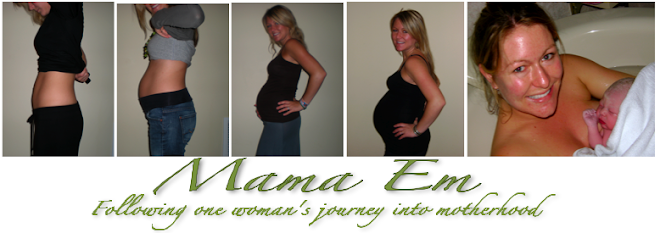Have you heard of Dunstan Baby Language? A couple days ago on Facebook, a friend posted this great Oprah interview of Priscilla Dunstan explaining the five words all infants use to communicate.
It's a must-see video, especially for any new or soon-to-be parent. For anyone, though, it's amazing. Dunstan takes the concept of moms reading their babies' cries one step further to prove that all infants speak the same language. Except I think she's missing something.
My problem with Dunstan Baby Language is that Dunstan doesn't identify a word for needing to eliminate. As someone who uses Elimination Communication, I absolutely believe she's missing at least one word, if not two. Or, perhaps Dunstan recognizes those words, but doesn't believe our culture is ready to move away from diapers. After all, most Americans (and I'm sure Australians) are pretty skeptical when they first come across EC.
I started using EC with Tye around 3 months and thought I'd do the same with Etta, waiting until she had strong enough head control to make holding her easier and waiting until she started urinating less frequently. However, Etta is a gassy girl. It all started with her tongue tie, and it's become much better since then. But like all babies, Etta continues to have gas. When she's uncomfortable, I can sometimes soothe her with the Superman Hold, but we've had many times when that wasn't enough.
Knowing that Etta needed to get some gas out and perhaps poop as well, I started holding Etta, sans diaper, over the little potty in our EC hold- her back to my belly, my hands under her thighs with her legs up towards her abdomen. Her head leans up against my torso, so it isn't as difficult as I had imagined it could be (plus Etta's head control is improving daily). As it turns out, this has been a lifesaver. Etta relieves herself of excess gas and usually poops, too. We've even caught a few pees (she often pees right after she poops). I'm so glad I started this one day in my desperation to console Etta. Now, when she's gassy and super fussy, I can actually do something about it and help her find some relief.
Since watching Oprah's interview of Dunstan, though, I keep thinking of infant communication. When I hold Etta, if she needs to go, she grunts. Sometimes she grunts for several minutes before she finally poops, and she'll keep grunting until she's done. If I'm patient and trust her communication, she goes every time. If she doesn't need to go, or if she's done going, she'll squirm and make another sound or just sit silently, motionless. Her communication is as clear as can be.
In the video, Oprah laughs at Dunstan's word for lower-abdominal gas, saying, "I know what that means!" The audience laughed. We all know that sound- when a baby makes it clear she's pooping. It's so obvious that Oprah can joke about it and the whole audience gets it. However, that sound is slightly different than what Dunstan describes as lower-abdominal gas. The babies in the video are definitely not pooping. So why doesn't Dunstan list a word for "I need to poop?" And is there also a word for "I need to pee?" I haven't found that one yet, and perhaps it's mostly body language, but if there is a word, I would think Dunstan could hear it.
The magic of Dunstan's Baby Language is that it allows us as parents to hear our children's communicative attempts with greater insight and meet their needs with food, sleep, and comfort. Elimination Communication is just an extension of the same concept- hearing a child communicate a need and responding to it. Besides the myriad other benefits, it's made our home much more peaceful these past couple weeks.

No comments:
Post a Comment
I love your comments!
-Em